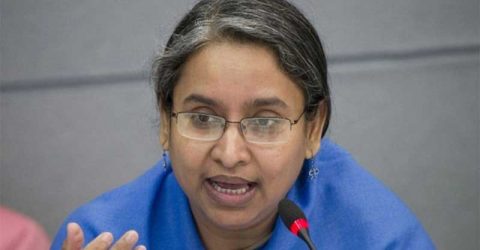
Ever since the present government in Bangladesh came to power in 2009 it has faced regular accusations for being too India centric to the exclusion of other major powers. The foreign policy of Bangladesh was described as anchored to the so called Delhi axis.
But after Prime Minister Sheikh Hasina’s trip to Moscow from 14-17 January 2009, the same view of the non dynamic foreign policy of Bangladesh changed profoundly. After that historic visit, responsible analysts were saying that our foreign policy had entered a major new phase of balance and diversification. The inherent risks of putting all eggs in a few baskets ended with the courting and finding of new friends and allies such as Russia and China. Both Russia and China are now emerging as major sources of varied forms of supports for Bangladesh.
It could be argued that the Bangladesh PM’s going to Moscow and signing a major arms deal valued some $ 1.5 billion in arms from Russia, plus another deal to build a nuclear reactor in Bangladesh, were noted in Washington and Delhi that Bangladesh’s foreign policy makers are their own bosses. The present government in Bangladesh should be able to silence often harsh and unfair criticisms effectively to the effect that it is but a puppet of New Delhi and likely to respond slavishly to every order from it.
The new foreign policy re-calibration can be also explained in part by the aggressive Myanmar attitude towards Bangladesh. Bangladesh aspired to see the USA as a curative influence on Myanmar. But probably in the perception of its incumbent government that simply did not happen. Dhaka has been sensing Myanmar as a potential military threat as a result of its earlier hostile posture on the maritime boundaries between the two countries.
It still has credible reasons to think that Yangoon could seek to embroil Bangladesh in military conflict over Rohingyas. An international tribunal demarcated the sea boundaries between the two countries but Yangoon only ‘apparently’ accepted the same.
In this context, Bangladesh was in search of military hardware to improve its position vis-à-vis Myanmar. And not succeeding in getting a good response from Western countries to that end, settled on Russia as the alternative.
But needless to say, USA and other Western countries do not like a developing country to make its arms procurement from Russia which they see as a competitor country. Besides, they also fear that they would lose vital influence over a country that switches its defence procurement from them in favour of Russia.
Analysts have also seen a dip in relations between Dhaka and Western countries over alleged human rights violation of the former and alleged shabby treatment of Professor Yunnus by the government much to their dislike.
Another outcome of PM Hasina’s Russia visit could be deepening of relations between Dhaka and Moscow for exploiting and developing Bangladesh’s energy sources. Gazprom, Russia’s biggest oil and gas exploration and production company, clicked a deal with Petrobangla two years ago to develop ten gas fields in Bangladesh.
As Russian President Vladmir Putin reiterated on several occasions during our Prime Minister’s stay in Moscow, Russia is keen to further intensify its cooperation with Bangladesh for the latter to see quick results in exploring its oil and gas resources.
Analysts see the Russian role as a big challenge specially to US owned and based international oil companies (IOCs) which have a presence in Bangladesh and are trying to get controlling positions in harnessing the potential huge reserves of gas and oil in the Bay of Bengal as well as onshore areas.
Bangladesh is now engaged in a process of leasing out its sea territories to IOCs particularly after the demarcation of its sea frontiers with Myanmar. More sea territories for Bangladesh to exploit has also become available after another international tribunal declared the result of its arbitration activities between India and Bangladesh in the current year. Russia is known to be eyeing prospects of large scale participation in Bangladesh’s gas and oil sector keeping in view the above developments.
Bangladesh has also spectacularly increased its economic cooperation with China. China is now actively engaged with Bangladesh in building economic zones and other mega projects. Bangladesh has become a major partner of China in its belt and road initiative in Asia.
Under these circumstances, Bangladesh is clearly seen as a country which fully determines who it will have close relationship with notwithstanding propaganda to the contrary that it is exclusively tied to the apron strings of India.




